AI-Led Interviews | Data-Driven Hiring
AI Interview Tools: How They Work, Top Picks, and How to Choose
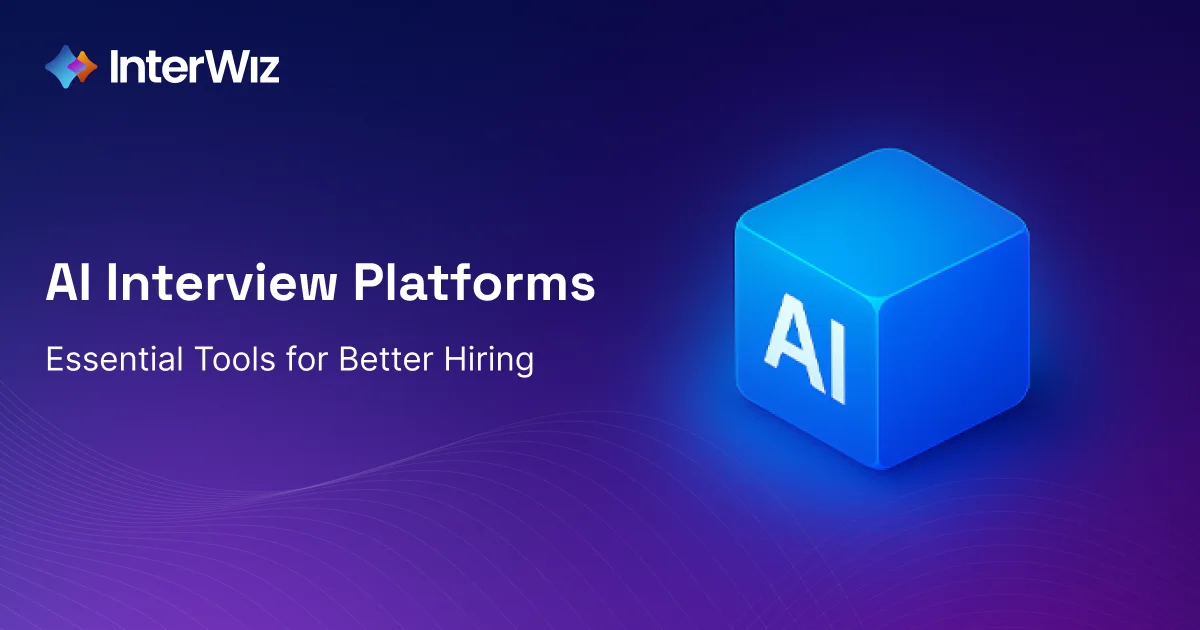
AI interview tools cut screening time by up to 40% and improve hiring accuracy by 95%, thanks to standardized, bias-reduced evaluations. As talent competition intensifies and hiring cycles grow shorter, these platforms are becoming a strategic necessity rather than a novelty.
In this guide, you’ll learn what AI interview tools are, how they work, and which features matter most when evaluating options. We’ll also compare leading platforms in 2025, including InterWiz, and give you a practical framework to choose the right tool for your hiring needs.
What Are AI Interview Tools and Why They Matter Now
AI interview tools are software platforms that use artificial intelligence to conduct and evaluate job interviews, often with the ability to integrate skill assessments. They apply natural language processing (NLP), machine learning, and audio/video analysis to assess candidate responses for communication quality, technical expertise, and cultural alignment.
Typical functions include sending interview invitations, recording and transcribing responses, analyzing verbal and non-verbal cues, and generating structured scoring reports for recruiters. Many also integrate assessments such as coding challenges, language tests, or personality evaluations, creating a unified candidate review process.
By automating repetitive interview tasks and providing consistent scoring, AI interview tools help recruiters move faster, evaluate more accurately, and scale recruitment without sacrificing quality.
How AI Interview Tools Work
AI interview tools follow a structured workflow designed to automate candidate evaluation while keeping the process fair and consistent. While specific features vary by platform, the core steps typically include:
Setup and Customization: Recruiters select or create interview templates, choose assessment types (if supported), and configure scoring criteria.
Candidate Invitation: The platform sends candidates an automated invite with interview instructions and a secure link, often allowing them to complete the session at a convenient time.
Response Recording: Candidates record their answers to pre-set or adaptive questions via video, audio, or text. Some platforms also include role-specific tasks such as coding tests or language prompts.
AI-Driven Analysis: The system processes responses using NLP, machine learning, and, where applicable, video/audio analysis to evaluate factors like communication clarity, technical accuracy, and adherence to role requirements.
Reporting and Ranking: The tool generates structured reports with scores, rankings, and sometimes transcript highlights or flagged insights, enabling recruiters to shortlist top candidates quickly.
By following this flow, AI interview tools streamline screening and free up recruiters to focus on final-stage interviews and strategic hiring decisions.
Key Features to Expect in AI Interview Tools
While features vary between platforms, the most effective AI interview tools share capabilities that improve speed, consistency, and decision-making in hiring.
Automated Interview Scheduling: Sends candidates interview links and reminders, reducing back-and-forth communication and eliminating scheduling delays.
Customizable Question Templates: Let recruiters tailor interviews to specific roles, industries, or skill sets, ensuring relevant and role-specific evaluations.
Integrated Skill Assessments: Some platforms combine interviews with coding challenges, language proficiency tests, or personality assessments to provide a more complete view of candidate ability.
AI-Powered Evaluation: Uses NLP and machine learning to analyze candidate responses for content, communication clarity, and alignment with predefined scoring criteria.
Bias Reduction Protocols: Standardize questions and scoring to minimize subjective human bias in evaluations.
Detailed Analytics and Reporting: Delivers structured insights such as rankings, skill breakdowns, and candidate transcripts to support data-driven hiring decisions.
ATS and HRIS Integration: Syncs interview data directly with your applicant tracking system for a smoother recruitment workflow.
For example, InterWiz combines AI-led interviews with customizable assessments, end-of-interview scoring, and automated scheduling, enabling recruiters to evaluate both technical and soft skills without sacrificing candidate experience.
Best AI Interview Tools in 2025
Choosing the right AI interview tool isn’t about picking the one with the longest feature list; it’s about finding the platform that fits your hiring volume, role complexity, and process needs. Below are eight of the strongest AI interview platforms in 2025, each with distinct advantages.
1. InterWiz
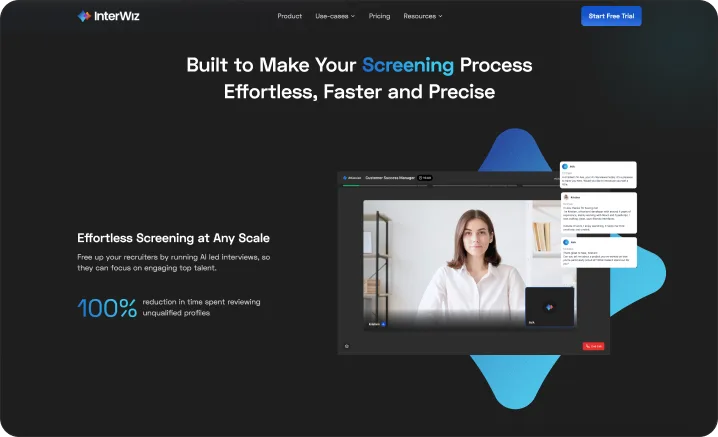
InterWiz delivers AI-powered, human-like interviews that assess skills, personality, and potential at scale. Designed for staffing agencies and tech companies, it combines structured interviews with skill-based, professional, analytical, and technical assessments, all supported by automated scheduling, proctoring, and seamless integrations.
Standout features:
Interview Templates: Pre-built and customizable templates for 80+ roles.
Skill & Competency Assessments: 100+ role-specific skills, soft skills, and behavioral assessments, plus coding challenges for technical roles.
Instant Recommendations: AI-generated hiring recommendations after each interview, with standardized scoring for fairness.
Personality Insights: Personality profiling to understand team fit.
Full Recordings & Transcripts: Review every detail for transparent decision-making.
Scheduling & Proctoring: One-click scheduling, cheat detection systems, and trust scores.
Integrations: Connects with ATS platforms like Zoho Recruit and Pinpoint, and collaboration tools like Slack.
Ideal for: Recruiters who need a single platform to run interviews, evaluate skills, reduce bias, and speed up hiring without compromising candidate experience.
2. HireVue
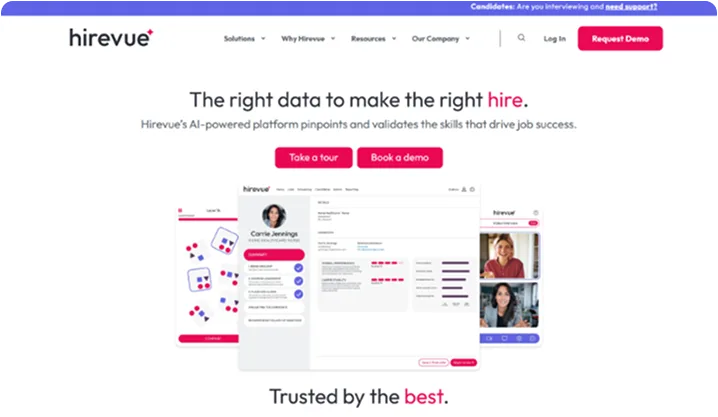
HireVue is an enterprise-grade AI-powered interviewing and assessment platform used by organizations worldwide to streamline hiring. Its Intelligent Interviewing suite enables live and on-demand video interviews, skills validation, and automated scheduling, all integrated with major ATS platforms. HireVue helps speed up hiring and reduce bias by using science-backed assessments and automated workflows for both high-volume and specialized roles.
Standout features:
Intelligent Interviewing: Live and on-demand video interviews with customizable question sets.
Skills Validation: Virtual Job Tryouts and AI-powered assessments for role-specific skills.
Scheduling & Automation: Self-scheduling tools and workflow automation to keep candidates moving through the funnel.
Talent Engagement: 24/7 AI-driven candidate engagement and matching.
ATS Integration: Seamless integration with existing hiring systems.
Ideal for: Large enterprises hiring across multiple geographies and role types that need both scale and advanced assessment capabilities.
3. Willo
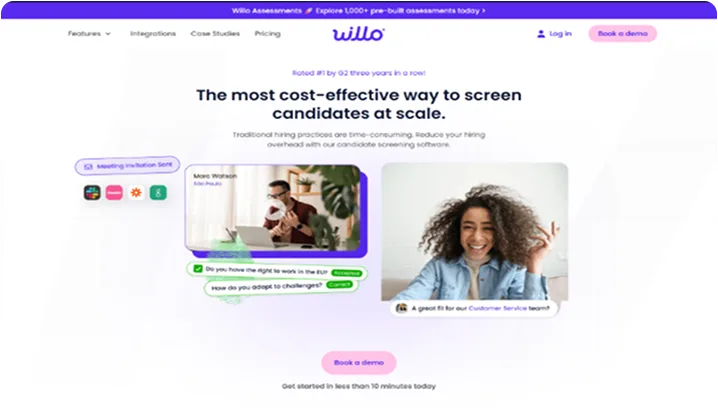
Willo is a candidate-first video interviewing platform designed to simplify high-volume and remote hiring. It supports asynchronous video, audio, and written responses, allowing candidates to interview at their convenience while giving recruiters an easy way to review and share results. With integrations to 5,000+ applications, customizable branding, and strong data security, Willo is trusted by more than 5,000 organizations worldwide.
Standout features:
Flexible Response Formats: Video, audio, and written answers, plus file uploads up to 25MB for portfolios or CVs.
Candidate-Centric Design: Accessible on any device and browser, with personalized branding for a consistent experience.
Collaboration Tools: Share, rate, and comment on candidate responses with colleagues and clients.
ATS Integrations: Works with popular systems like Greenhouse and supports enterprise workflows.
Security & Compliance: ISO 27001 certified, GDPR compliant, with enterprise-grade data protection.
Productivity Gains: Cuts recruiter admin time by up to 12 hours a month and reduces time-to-hire by 30%.
Ideal for: Organizations seeking a cost-effective, globally accessible solution for asynchronous candidate screening at scale.
4. Vervoe
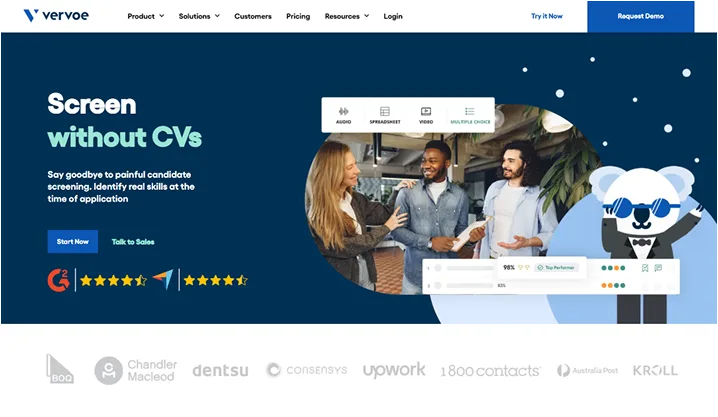
Vervoe is an AI-powered skills assessment platform that integrates candidate testing with interview-like question formats. Instead of relying on CVs, it evaluates job-specific and soft skills through real-world tasks, ranking applicants by performance. Recruiters can use its library of hundreds of scientifically mapped tests or build custom assessments using an AI-powered builder.
Standout features:
Skills-Focused Evaluation: Test role-specific abilities like coding, customer service, creative writing, or communication.
Customizable Assessments: Use pre-built assessments or create your own with AI assistance.
Performance-Based Ranking: Automatically scores and ranks candidates to simplify shortlisting.
Employer Branding: Customize the candidate experience with company branding, unique content, and personalized feedback.
Data-Driven Reports: Detailed insights into each candidate’s performance for confident hiring decisions.
Candidate Experience: Highly rated by candidates for its engaging and fair process.
Ideal for: Organizations prioritizing skill verification early in the hiring process, with the option to include structured, interview-style questions in assessments.
5. Spark Hire
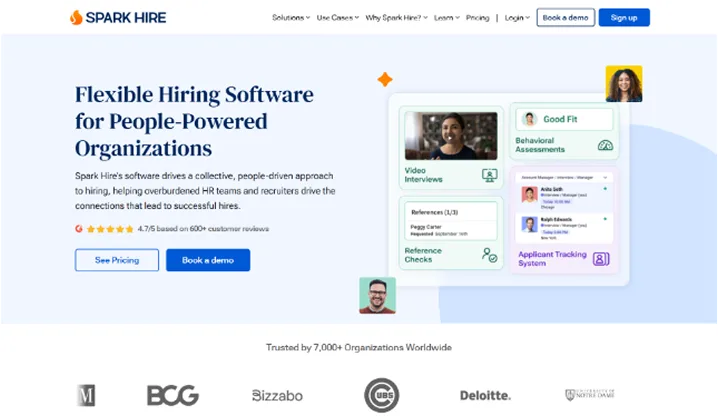
Spark Hire offers a flexible hiring platform that combines one-way video interviews, predictive talent assessments, automated reference checks, and an applicant tracking system (ATS). Designed for SMBs and growing teams, Spark Hire supports both standalone video interviewing through its Meet product and fully integrated recruiting workflows via Spark Hire Recruit.
Standout features:
One-Way Video Interviews: Streamline screening with asynchronous interviews that candidates can complete at their convenience.
Predictive Talent Assessment: Behavioral insights to predict a candidate’s capacity for success in the role.
Automated Reference Checks: Gather structured feedback from references without manual chasing.
ATS Integration or Built-In ATS: Integrates with 40+ ATS platforms or use Spark Hire’s own collaborative ATS.
AI Assistance: Auto-generate job descriptions, screening questions, tailored interview prompts, and candidate communications.
Collaboration Tools: Share candidate videos, track feedback, and align hiring teams through centralized workflows.
Ideal for: Small to mid-sized organizations that want a scalable, collaborative hiring solution with both standalone and integrated interview capabilities.
6. myInterview
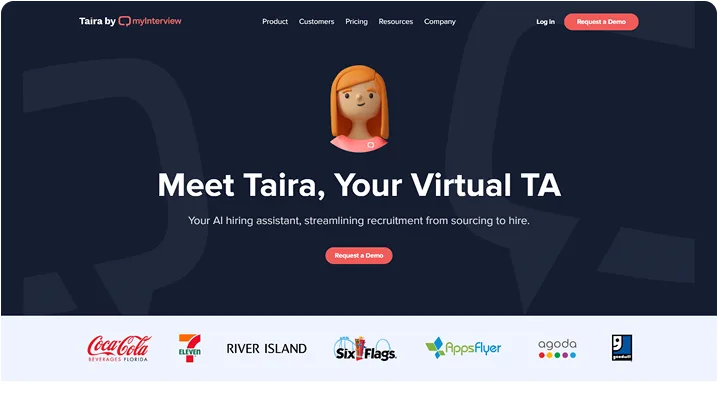
MyInterview now powered by its AI hiring assistant “Taira,” helps organizations streamline recruitment from sourcing to hiring. Its AI-driven platform combines video interviewing, automated scheduling, and intelligent candidate screening, allowing recruiters to focus on the most qualified applicants. Taira integrates directly with tools like MS Teams, Slack, and leading ATS platforms to fit seamlessly into existing workflows.
Standout features:
AI-Powered Video Interviewing: Screen candidates at scale with structured, on-demand interviews analyzed for skills, experience, and role fit.
Automated Scheduling: Eliminate back-and-forth with AI-managed interview scheduling and rescheduling.
AI Candidate Screening: Instantly filter applicants using role-specific criteria and predictive matching.
Workflow Integration: Works inside MS Teams, Slack, and your ATS for a unified hiring process.
Recruitment Assistant Tools: Support onboarding, generate actionable insights, and assist with closing top candidates.
Ideal for: Organizations seeking a fully integrated AI interview solution that automates repetitive hiring tasks while maintaining a strong candidate experience.
7. Harver (formerly Outmatch)
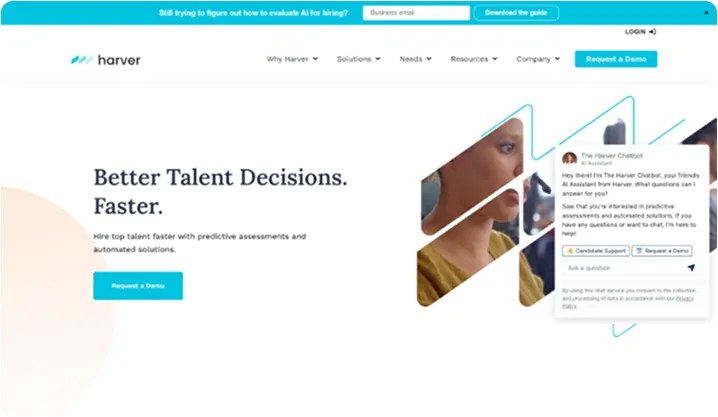
Harver is a predictive hiring platform that combines assessments, automation, and interview scheduling to accelerate talent decisions. While best known for its science-backed assessments, Harver also offers integrated interview tools that help recruiters move qualified candidates quickly from screening to live conversation. Its platform is designed to reduce bias, improve candidate fit, and provide actionable insights across high-volume and specialized hiring.
Standout features:
Predictive Assessments: Evaluate job-relevant skills, competencies, and behavioral traits.
Automated Candidate Prioritization: Identify top candidates and advance them to interviews automatically.
Interview Scheduling: Seamless scheduling to keep high-potential candidates engaged.
Reference Checking: Automated reference collection for faster, more complete candidate profiles.
Data-Driven Insights: Centralized analytics to track performance and make unbiased hiring decisions.
Bias Reduction: Gamified and structured assessments to support inclusive hiring practices.
Ideal for: Enterprises and staffing teams needing a unified platform for assessment-driven hiring with integrated interview capabilities, especially in high-volume recruitment environments.
8. VidCruiter
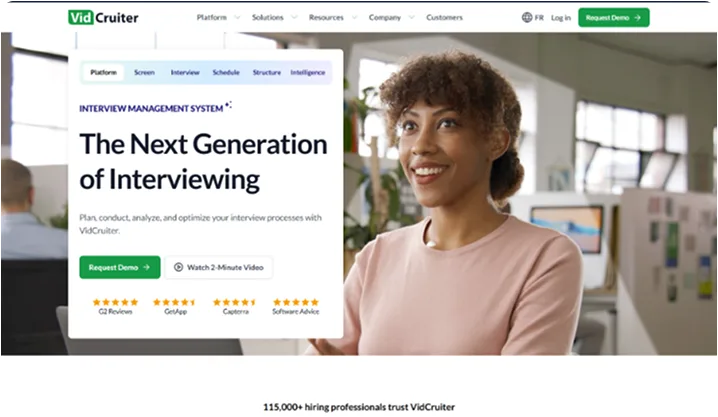
VidCruiter offers a comprehensive suite of AI-enhanced video interviewing solutions, including pre-recorded, live, hybrid, and structured interviews. Its Interview Management System centralizes planning, conducting, and analyzing interviews, with automation and ethical AI features to improve speed, consistency, and compliance. The platform integrates with leading HR systems and supports high-volume hiring across industries such as the public sector, manufacturing, education, and contact centers.
Standout features:
Multiple Interview Formats: Pre-recorded, live video, digital in-person, hybrid, and structured interviews.
Interview Management System: Plan, conduct, and analyze interviews from one platform.
AI Tools: AI-generated interview notes, fraud detection, and soon-to-launch interview intelligence for process optimization.
Automation: Interview scheduling, automated reference checks, and skills testing.
Compliance & Inclusion: Tools for interview compliance, diversity, and equitable hiring decisions.
Integrations: Works with top ATS and HR systems such as Workday, SAP, ADP, UKG, and Oracle.
Ideal for: Organizations seeking a highly configurable, compliance-ready interview platform that supports multiple formats and integrates seamlessly with enterprise hiring systems.
Also read: 25 Best HR AI Tools for Every Team: Sourcing, Interviewing, Onboarding & Beyond
Key Benefits of Using AI Interview Tools
Adopting AI interview platforms can transform how organizations attract, assess, and hire talent. When implemented strategically, these tools deliver measurable gains in speed, quality, and fairness.
Faster Time-to-Hire: Automates scheduling, enables asynchronous interviews, and delivers instant scoring, reducing recruitment timelines by up to 30–40% (Aptitude Research). This speed helps secure top candidates before competitors make offers.
Consistent and Fair Evaluations: Applies the same questions, scoring rubrics, and evaluation logic to every candidate, reducing unconscious bias and creating fairer, more diverse shortlists. Tools like InterWiz use structured templates and bias-reduction protocols to support equity.
Scalability for High-Volume Hiring: Handles hundreds or thousands of interviews simultaneously, allowing recruiters to manage seasonal surges or continuous high-volume hiring without adding extra staff.
Deeper Candidate Insights: Goes beyond verbal responses to assess communication clarity, problem-solving approach, and role-specific skills. Many platforms integrate coding challenges, language tests, or situational judgment questions for a fuller evaluation.
Improved Candidate Experience: Offers flexible, on-demand interviews that candidates can complete at their convenience, often via mobile devices, reducing scheduling conflicts and boosting completion rates, especially for global or remote talent pools.
How to Choose the Right AI Interview Tool
With dozens of AI interview platforms available, selecting the right one requires more than just comparing feature lists. A structured decision process ensures your investment aligns with hiring needs, candidate expectations, and long-term goals.
1. Define Your Hiring Volume and Frequency
High-volume hiring (e.g., seasonal or large-scale recruitment) calls for platforms that can process hundreds of interviews simultaneously and offer bulk candidate management. Lower-volume, high-specialization hiring may prioritize in-depth assessment capabilities over scale.
2. Match Features to Role Requirements
Consider whether your roles require technical tests, soft skill evaluations, language proficiency checks, or simply structured interviews. For example, platforms like InterWiz allow you to combine multiple assessments in one session, while others may focus on a single interview format.
3. Evaluate Integration Needs
Seamless integration with your applicant tracking system (ATS) or HRIS reduces manual work and keeps candidate data in one place. Check whether the tool supports your existing tech stack or offers open APIs for custom integration.
4. Assess Bias-Reduction Capabilities
Look for platforms that use structured question sets, standardized scoring rubrics, and built-in bias auditing. This is critical for compliance in regions with emerging AI hiring regulations.
5. Consider Reporting and Analytics Depth
Some platforms offer only basic pass/fail scoring, while others provide detailed analytics, candidate rankings, and interview transcripts. Choose based on how much data your hiring team needs to make confident decisions.
6. Test Candidate Experience
The ease with which candidates can access, complete, and submit their interviews can impact response rates. Request a demo or trial to experience the process from the candidate’s perspective before committing.
Takeaway: The right AI interview tool should fit your hiring volume, integrate with your existing systems, reduce bias, and deliver the insights your team needs, all while ensuring candidates have a smooth, engaging experience.
Real-World Use Cases of AI Interview Tools
AI interview platforms are already delivering tangible results across different hiring environments. Here’s how they’re being applied in practice:
Staffing Agencies Managing Thousands of Applications
Agencies use asynchronous interviews to screen hundreds of candidates simultaneously. The system automatically scores and ranks responses, enabling recruiters to forward only top-performing candidates to clients, reducing placement time and improving client satisfaction.
Tech Companies Hiring for Dual Skill Sets
For roles requiring both technical and interpersonal abilities, AI interview tools can combine coding challenges with soft skill evaluations in a single session. For instance, a software engineer might complete a timed coding test followed by situational interview questions, all scored by AI for consistency.
Global Enterprises Scaling Remote Recruitment
Large organizations conducting multinational hiring can avoid scheduling bottlenecks. Candidates record responses at their convenience, while recruiters review submissions on their schedules, streamlining global recruitment without time zone conflicts.
Retailers and Hospitality Brands Filling Seasonal Roles
High-volume seasonal hiring becomes more manageable with automated pre-screening. AI interviews quickly identify the most qualified applicants so hiring managers can focus only on the top tier, reducing time-to-fill for short-term positions.
Startups Building Teams Quickly
Early-stage companies can maintain consistency in hiring decisions even with multiple team members involved. AI interview tools ensure every candidate is evaluated against the same criteria, reducing bias and improving early hires.
Takeaway: From high-volume staffing to specialized technical recruitment, AI interview tools adapt to the hiring context, providing consistent evaluations and freeing recruiters to focus on strategic decision-making.
Bottom Line: Should You Use AI Interview Tools?
AI interview tools are no longer a niche add-on; they’ve become a practical, high-impact component of modern hiring strategies. Whether you’re managing thousands of applications or filling a few critical roles, these platforms can speed up screening, reduce bias, and deliver deeper candidate insights without increasing recruiter workload.
The right choice depends on your hiring volume, role complexity, and integration needs. For example, InterWiz offers a unified solution for both interviews and assessments, while others focus on specific formats such as live video or asynchronous screening.
If your hiring process struggles with scheduling bottlenecks, inconsistent evaluations, or limited capacity for high-volume recruitment, adopting an AI interview tool can create measurable improvements in both efficiency and hire quality, helping your team secure top talent faster.
FAQs About AI Interview Tools
Are AI interview tools fair?
Most AI interview platforms use standardized questions and scoring rubrics to reduce unconscious bias. However, fairness depends on proper configuration, regular audits, and compliance with applicable hiring regulations.
Can AI interview tools replace human recruiters?
No, AI interview tools are designed to handle repetitive and time-consuming tasks, freeing recruiters to focus on final interviews, candidate engagement, and strategic decision-making.
Do candidates like AI interviews?
Many candidates appreciate the flexibility of on-demand interviews, especially for remote or global hiring. However, some may prefer live human interaction, so balancing both approaches is important.
How accurate are AI assessments?
Accuracy depends on the quality of the AI model, the design of the questions, and the scoring criteria. Well-designed tools can improve consistency and reduce human error, but they should complement, not replace, human judgment.
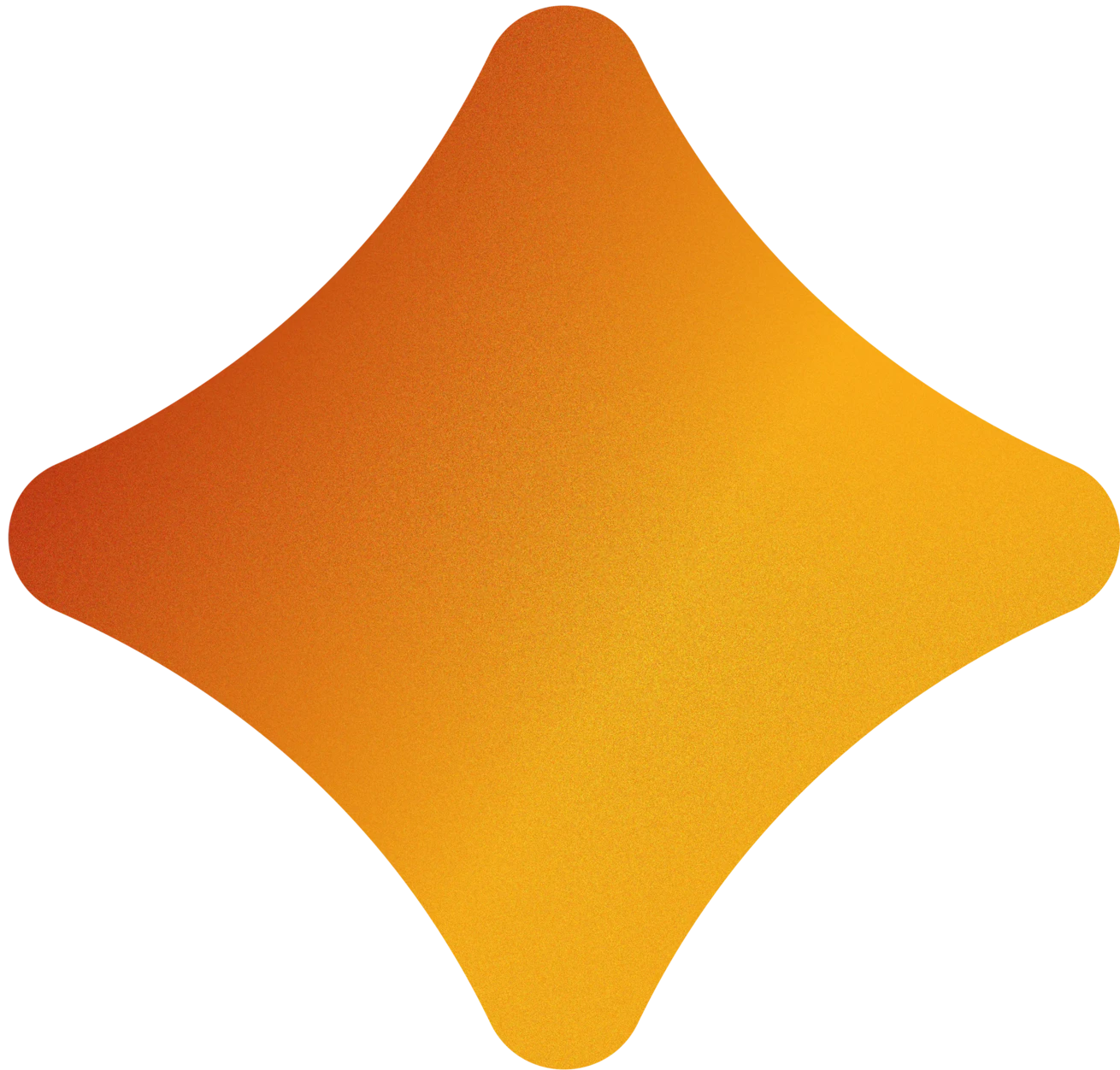
High Quality Screening with AI Interviews
Automated interviews built for speed, scale, and accuracy.
🔥 Full features, no credit card required.